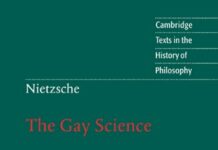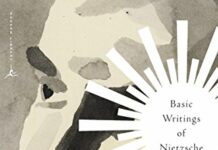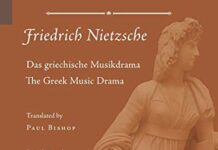
Ebook Info
- Published: 2007
- Number of pages: 176 pages
- Format: PDF
- File Size: 0.91 MB
- Authors: Friedrich Nietzsche
Description
I am not a man, I am dynamite.’Ecce Homo is an autobiography like no other. Deliberately provocative, Nietzsche subverts the conventions of the genre and pushes his philosophical positions to combative extremes, constructing a genius-hero whose life is a chronicle of incessant self-overcoming. Written in 1888, a few weeks before his descent into madness, the book sub-titled ‘How To Become What You Are’ passes under review all Nietzsche’s previous works so that we, his ‘posthumous’ readers, can finally understandhim aright, on his own terms. He reaches final reckonings with his many enemies – Richard Wagner, German nationalism, ‘modern men’ in general – and above all Christianity, proclaiming himself the Antichrist. Ecce Homo is the summation of an extraordinary philosophical career, a last great testament toNietzsche’s will.
User’s Reviews
Reviews from Amazon users which were colected at the time this book was published on the website:
⭐I must admit: this review will be biased… Nietzche happens to be my favorite philosopher so any book by him will be higly praised automatically by me.Perhaps the sole warning about this book I would give to a prospective buyer is this: Ecce Homo is not an objective autobiography. If one is looking for objectivite and exactitude in the description of life events, look elsewhere. This book is not for you. It is more of a psychological autobiography. The author explains who he is, why he is how he is and what makes him so special as well as providing glimpses about what he thought his real legacy would be. In a nutshell, if Nietzsche is already your hero,and you would love to know him more and get a glimpse of what made him tick, then, by all means, rush and buy this book. Otherwise, don’t.
⭐I bought the book on purpose and enjoy my reading. The delivery was prompt and the condition as advertised.
⭐excellent book great content
⭐Duncan Large’s new translation of Ecce Homo for the Oxford World Classics series is excellent: it is as authoritative and accurate as it is fresh and easy to read. Anyone teaching this book, especially, or even recommending it to others, should tell them about this version. It lends an entirely different flavor to the German, exactly what a new translation should do. Though Roger Hollingdale’s version is the most solid, in my view, and Walter Kaufmann’s the most forceful, this translation seems to get at the precariousness, the grotesqueness of the German, and particularly the tension it establishes with the tradition of autobiography. The biggest change Large adopted was to use the second person singular pronoun much more for the German “Man.” Thus, for “Wie man wird, was man ist,” the famous subtitle of the little volume, we do not get the more traditional translation with the impersonal “one,” as in Hollingdale’s rendition “How One Becomes What One Is,” but the much more interesting and simple “How To Become What You Are.” The effect is remarkable when it is dispersed across the entire book. It is an entirely different–and I think more interesting–experience of reading.Though some crucial things are lost (and every version, Kaufmann’s especially does this), Large’s translation, I think, benefits in the end for being so very bold. Hollingdale saves some key words better perhaps than Large, who interprets them more, it could be said–and interprets them precisely by going back to the roots of the German words, which should not in itself be seen as an act of fidelity to the source text’s meaning, as is so often taken to be the case in philosophical translations of German (though this allows you, the reader, to reinterpret them more easily). But it should be noted that Large is *much* more close to the sentence structure than Hollingdale, which, in Nietzsche, as well as in most German and French, is often much much more crucial than we think it is (just pick up Barbara Harlow’s unbelievably horrible rendering of Derrida’s *Spurs*, which absolutely decimates this fact about Derrida’s text, if you want a good example of what this produces: a translation that is nearly unreadable and extremely misleading at times).Usually, though, any of these deviations with respect to the accepted translation as represented by Kaufmann and Hollingdale is done with a lot of thought on Large’s part–it is only thus that it could be so bold in the first place. Take, for example, his refusal to leave Nietzsche’s “Ressentiment” in the French–that is, translate it by “resentment:” at its first appearance he appends a note, sayingThe standard English translation “ressentiment,” characterizes it as a loan-word from the French, but Nietzsche spells it with an initial capital [this is true in fact always, mj], stressing that he considers it to have been successfully adopted into the German language (which gives all nouns initial capitals)–by contrast with “décadence,” [another frequent word that is French in origin], for instance.-Note to page 13, p. 101.Few would have the guts, I think, to do this to such a well known and oft quoted concept, but Large both does it and shows that it is right. The fundamental boldness of this translation, though, lies in that basic gesture I am circling around above, which uses “you” instead of “one.” Why this is so bold is that it fundamentally increases the danger of intimacy, of the cancellation of distance–which anyone who knows Nietzsche will tell you is absolutely crucial to him (cf. the famous passages on the “pathos of distance” in the Genealogy). Not only does it increase the danger for us, but also for Nietzsche himself: if it is true that this book is Nietzsche telling himself his life–the various “you’s” in the text, which can be interpreted as Nietzsche somewhat referring to himself, show how constantly the pressure is there to maintain some coherence, to will the relation of himself into some economy, some shape, and yet at the same time not have it collapse into self-identification. Giving us some sense of this danger might, by itself, be Large’s translation’s greatest triumph.
⭐This book is some sort of an autobiography of F. Nietzsche with his own short comments on his books, his literary and musical preferences, Christianity and the future of mankind. He also explains why he is a true immoralist.Nietzsche stresses the all important influence of Schopenhauer in his life: `I very earnestly denied my `will to life’ at the time when I first read Schopenhauer.’His preferred authors are H. Heine, Byron, Stendhal, P. Loti, P. Mérimée, A. France and G. de Maupassant. In music, he likes Rossini, Chopin, Schütz, Haendel, Liszt, Bizet and Bach.A true immoralistA true immoralist confirms a double negation; first, of the so-called supreme, good, benevolent and beneficent man, and secondly, of the altruistic Christian morality.He calls for `a revaluation of all values’. Concepts like God, soul, virtue, sin and eternal life are mere imaginings and lies prompted by the bad instincts of sick natures. All the problems of politics, social organization and education have been falsified because one mistook the most harmful men for great men.ChristianityBlindness to Christianity is the crime par excellence, the crime against life. Its morality is vampirism. It is the most malignant form of the will to lie. It is a gruesome fact that anti-nature received the highest honors and was fixed over humanity as law and categorical imperative. It invented a `soul’ to ruin the body. The Bible is a product of the will to suppress the truth. Its saints are slanderers of the world and violators of man.OptimismBut, F. Nietzsche remains a fundamental optimist, because men strive for the forbidden. Therefore, his philosophy will triumph one day, because that what was forbidden has always been the truth. Dionysus will be stronger than the doctrine of the Crucified.This book is a good introduction to the raging style, the reasoning with a hammer, the main themes, the Homeric battles and the `immoral’ obsessions of a fascinating, integer, but in some aspects, controversial philosopher with a too egoistic agenda for mankind.A must read for all Friedrich Nietzsche fans and lovers of Western philosophy.
⭐Nietzsche’s autobiography, in summary:”I have never given any attention to the concept of god, not even as a child. Perhaps I was never childish enough for it?””The concept of ‘The Beyond’ the real world invented as to deprive value from the only world in which one exists.””God is a crude answer, a piece of indelicacy against us thinkers.”
⭐His last work before insanity from tertiary syphilis (the later Will to Power being published by his philosophically unsophisiticated sister from his notebooks.)Nietzsche suggests to most “The Death of God”, by which he mean the death of a belief, not the death of a being. This work is his very self-regarding philosophical autobiography – there is not much content about his life – (for that read Hollingdale.) If you are interested in reading any of Nietzsche’s works co-textually this is an essential work. His perspectives are often enigmatic. but give insight into his method – the use of every rhetorical device in the Thesaurus, including self-contradiction. For example if you have read Thus Spoke Zarathustra and been mystified, in this work you will find much to help – that it was intended above all as music – an attempt to convey the indescribable, namely what some would call, and what he regarded (though not in such language) as a spiritual experience 6,000 feet in the Alps at Sils-Maria while suffering from unrequited love.Nietzsche was not, in the usual sense ultimately nihilistic (as so often perceived.) As a cultural critique and psychologist he was wonderful. (Freud thought him the most insightful of all people about themselves.) Ignore his arrogance, and the bad reputation he got from his sister’s agency in persuading the Nazi’s to adopt a caricature of his philosophy after his death (in fact he liked Jews) – immerse yourself, and you will encounter an intriguing and courageous mind. But if you want to know what philosophy as an academic subject is in the UK and the USA is all about – ignore Nietzsche.
⭐Very pleased with my purchase.Do note that this book editionis very small print
⭐Good book. Thank you
⭐Wow
Keywords
Free Download Ecce Homo: How To Become What You Are (Oxford World’s Classics) in PDF format
Ecce Homo: How To Become What You Are (Oxford World’s Classics) PDF Free Download
Download Ecce Homo: How To Become What You Are (Oxford World’s Classics) 2007 PDF Free
Ecce Homo: How To Become What You Are (Oxford World’s Classics) 2007 PDF Free Download
Download Ecce Homo: How To Become What You Are (Oxford World’s Classics) PDF
Free Download Ebook Ecce Homo: How To Become What You Are (Oxford World’s Classics)



